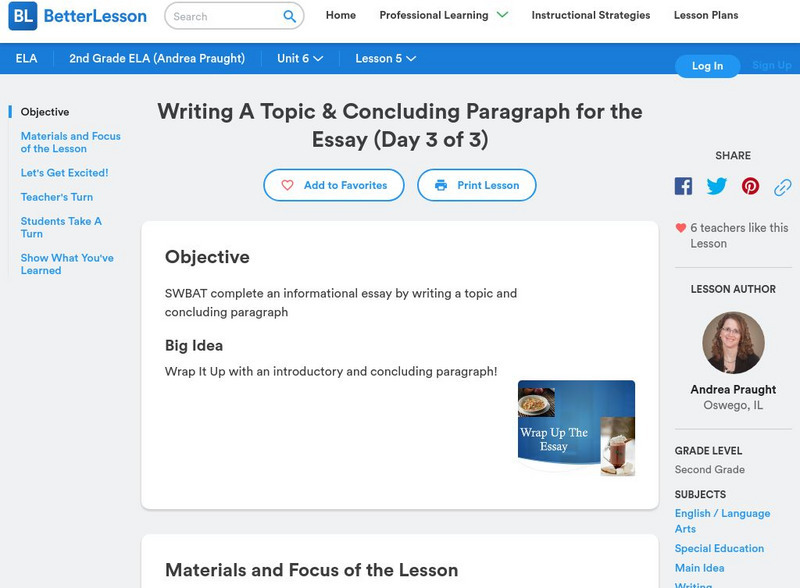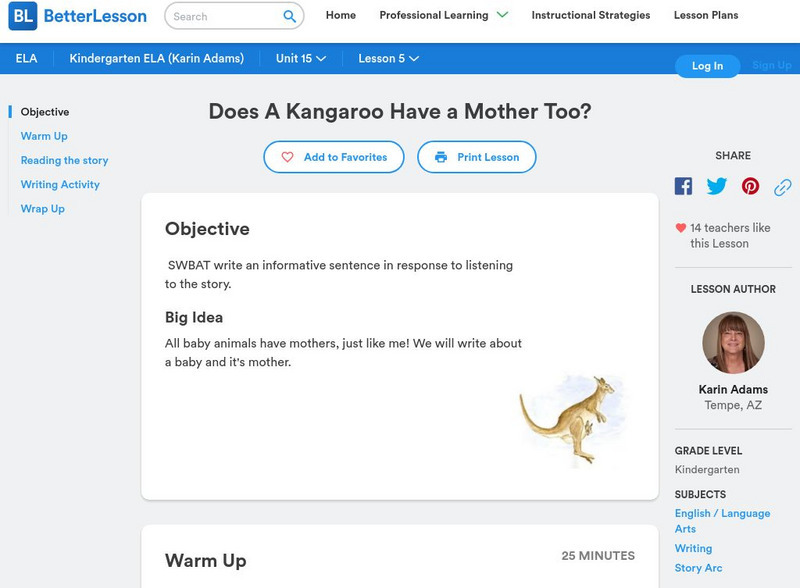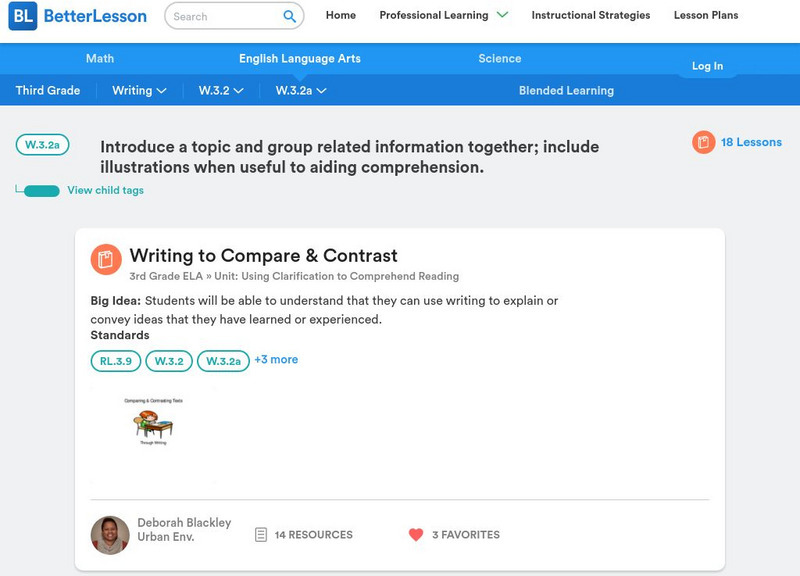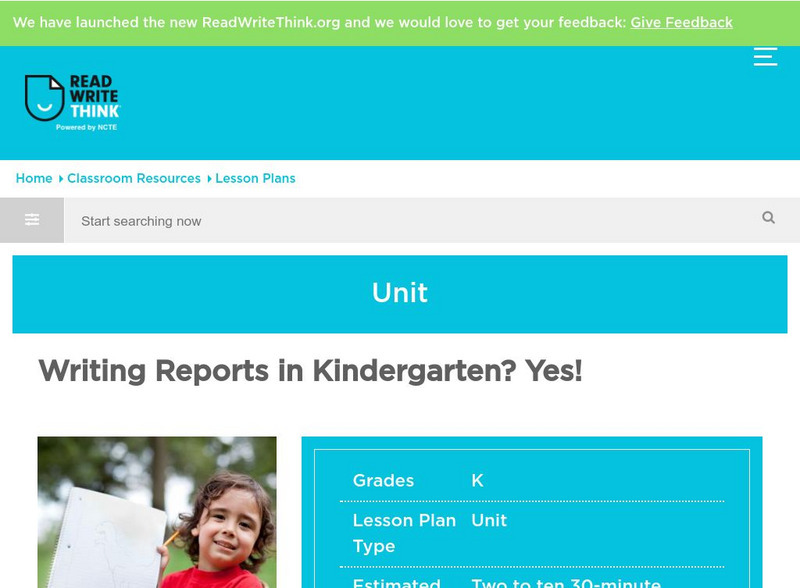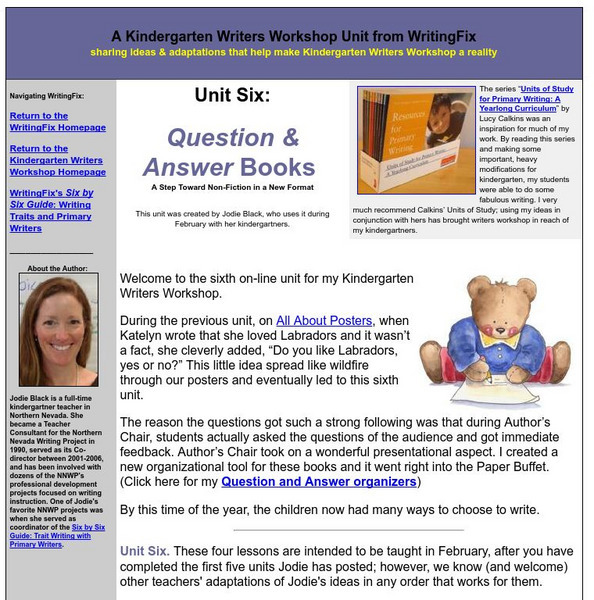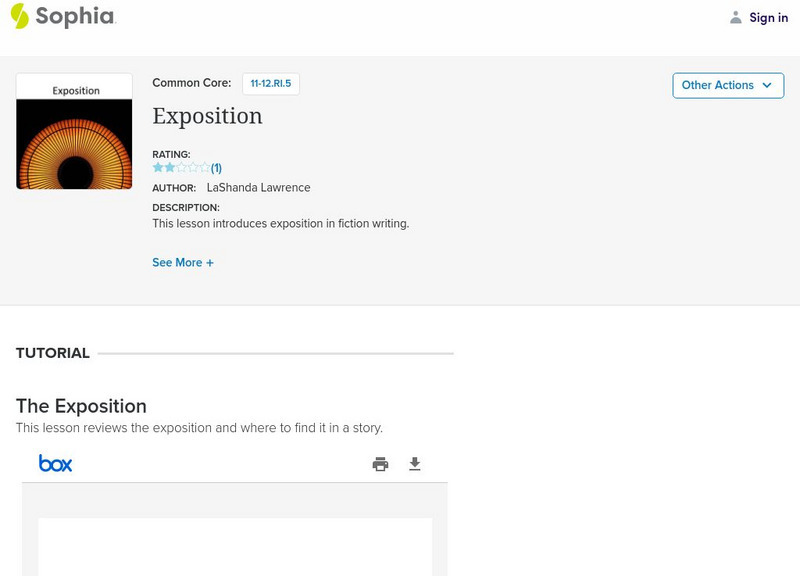Hi, what do you want to do?
Other
Grade 1 Informative Writing Lessons
Authored by the Tsehai Russell and Della Wright, CLR fellows, this resource provides a 5-day unit of informative writing lessons. Focus lessons related to facts and opinions and paragraph writing. This series is supported by the Academic...
Better Lesson
Better Lesson: Writing a Topic & Concluding Paragraph for the Essay
This lesson is a final step towards supporting students to practice writing an informative/explanatory paragraph conveying complex ideas and presenting information clearly and accurately. Second-grade students can usually write a...
Better Lesson
Better Lesson: Come Along Daisy
Students will engage in discussions about story details and write an informational piece about the events in the story "Come Along Daisy".
Better Lesson
Better Lesson: Mice Squeak, We Speak
In this instructional activity students will write an informative sentence in response to listening to the story; "Mice squeak, We speak". Included in this instructional activity are examples of student work, videos of oral...
Better Lesson
Better Lesson: Does a Kangaroo Have a Mother Too?
Students will write an informative sentence in response to listening to the story "Does A Kangaroo Have a Mother Too?". Included in this lesson are videos of mother and baby animals, pictures of the lesson in action, and a video of...
Better Lesson
Better Lesson: W.3.2: Write Informative/explanatory Texts to Examine a Topic
Links to 56 lessons and activities that build student skills in standard W.3.2: Write informative/explanatory texts to examine a topic and convey ideas and information clearly.
Better Lesson
Better Lesson: W.3.2c: Use Linking Words and Phrases to Connect Ideas
Links to 7 lessons and activities that build student skills in standard W.3.2c: Use linking words and phrases (e.g., also, another, and, more, but) to connect ideas within categories of information.
Better Lesson
Better Lesson: W.3.2d: Provide a Concluding Statement or Section
Links to 8 lessons and activities that build student skills in standard W.3.2d: Provide a concluding statement or section.
Better Lesson
Better Lesson: W.3.2b: Develop the Topic With Facts, Definitions, and Details
Links to 12 lessons and activities that build student skills in standard W.3.2b: Develop the topic with facts, definitions, and details.
Better Lesson
Better Lesson: W.3.2a: Introduce a Topic and Group Related Information
Links to 18 lessons and activities that build student skills in standard W.3.2a: Introduce a topic and group related information together; include illustrations when useful to aiding comprehension.
ReadWriteThink
Read Write Think: Writing Reports in Kindergarten
Lesson which provides three types of reports for early elementary students to share. These allow young students to see themselves as writers with something useful to contribute from an early age.
Writing Fix
Writing Fix: Question and Answer Books
Beginning writers work through a Writing Workshop format to create Question and Answer books. A series of mini-lessons, graphic organizers, possible texts, and samples of student work are all provided.
A to Z Teacher Stuff
Ato Zteacherstuff: Report Writing in Primary Grades
This is a fun, hands-on lesson from AtoZteacherstuff! Students go through a study of frogs while learning how to interpret and restate factual information.
CPALMS
Cpalms: What Do You Do With a Tail Like This?
[Free Registration/Login Required] In this instructional activity, young scholars will use What Do You Do With A Tail Like This? by Steve Jenkins and Robin Page to identify the main topic and key details using the illustrations and text....
Alabama Learning Exchange
Alex: Think, Write, Read: Expository Writing
While this lesson's main focus will be centered on expository writing, it will also integrate reading, computer, and organizational skills. After reading the novel, Shiloh by Phyllis Reynolds Naylor, students will write an expository...
Sophia Learning
Sophia: Introductions: Lesson 4
This lesson introduces introductions. It is 4 of 5 in the series titled "Introductions."
PBS
Pbs Learning Media: Police Reform
This lesson featuring videos from FRONTLINE: Policing the Police. Using Newark, NJ, as an example, learners gather evidence of discriminatory policing practices, examine the perspectives of police and community, and learn about changes...
Texas Education Agency
Texas Gateway: Reading Comprehension Across Genres: Annotate for Meaning
This lesson focuses on Annotation, a "writing-to-learn" strategy. It consists of writing explanatory notes and critical (analytical) commentary to yourself. Annotating text consists of two steps: (1) underlining, highlighting, circling,...






